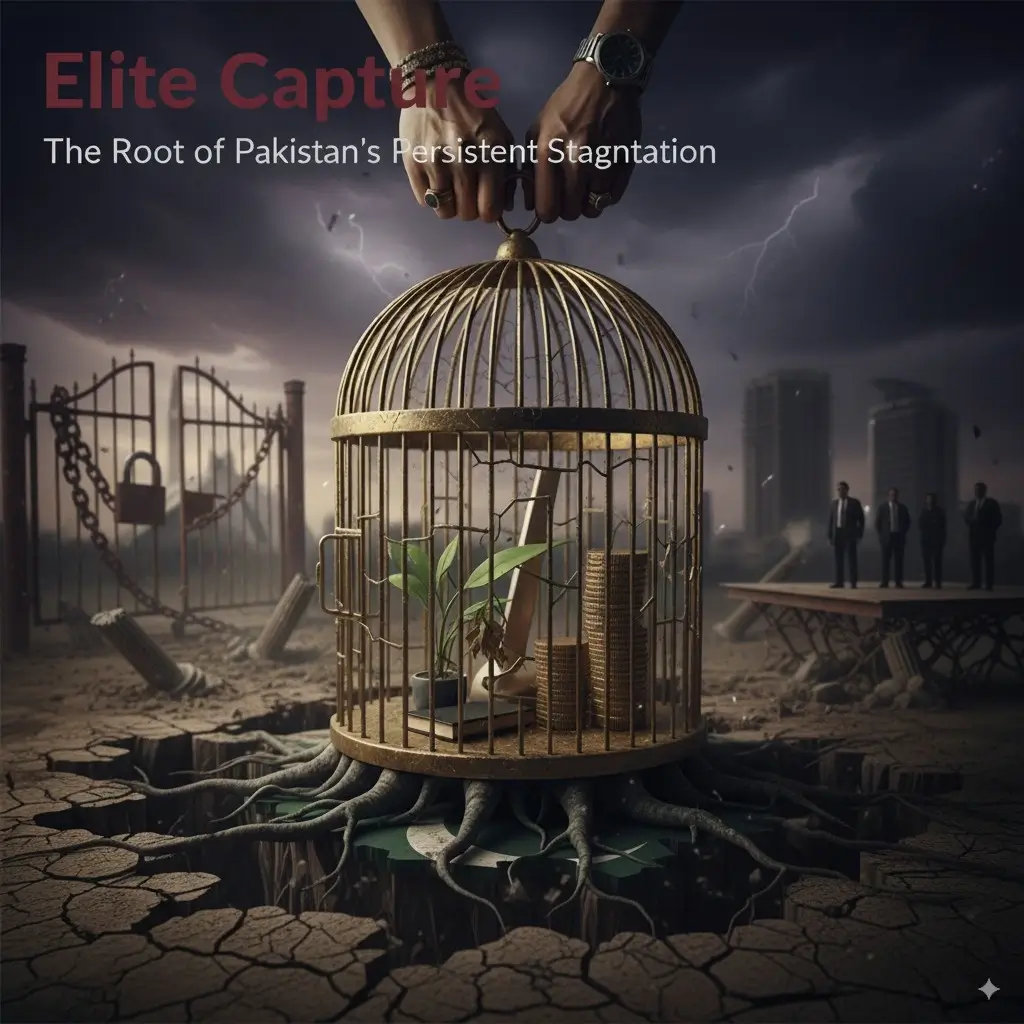
Elite Capture: The Root of Pakistan’s Persistent Stagnation. Pakistan ranks among the most over-diagnosed nations globally. For years, the country’s challenges and potential solutions have been well understood. Yet, meaningful action has remained elusive. Why have critical reforms never taken root? What consistently blocks genuine progress?
The answer lies in two simple words: elite capture.
A powerful, interconnected elite class dominates state institutions and controls a significant portion of the nation’s wealth. This small group influences governance, manipulates politics, and reaps undue benefits—all at the cost of the broader population and without their consent.
A Nation Held Hostage by Oligarchic Rule
Pakistan’s political arena has long been monopolized by a select few families. These dynasties have entrenched themselves in parliament across generations, ensuring the political system remains their playground. From local influencers to national powerbrokers, most political actors either emerge from elite circles or are eventually absorbed into them.
Despite transformative societal shifts—urbanization, a growing middle class, technological connectivity, and a more informed civil society—political structures have resisted change. Governance continues to serve entrenched interests, driven not by vision or public service, but by the pursuit of power.
Reform Resistance and Rent-Seeking
This ruling elite has consistently blocked vital reforms—land redistribution, tax justice, and good governance. Their behavior aligns with a rent-seeking mindset, leveraging political power to extract wealth without contributing to productivity.
As a result, Pakistan now grapples with severe governance issues: fiscal instability, energy crises, and water scarcity, among others. These are not mere administrative failings—they’re the consequences of deliberate elite dominance.
Not Just Elites—But the Kind of Elites
Elite control is not exclusive to Pakistan. What sets Pakistan apart is the depth of elite entrenchment and how it obstructs socioeconomic mobility and concentrates decision-making within a narrow circle. A unique element is the symbiotic relationship between military and political elites.
Though the military often positions itself as a meritocratic institution offering upward mobility, it frequently allies with the very political elite it critiques. Their mutual interest in maintaining the status quo binds them together through patronage networks.
Data-Backed Inequality and Economic Loss
The 2021 UNDP National Human Development Report exposed the economic privileges enjoyed by Pakistan’s elite groups—politicians, corporations, landowners, and the military—estimated at around $17.4 billion, or 6% of GDP. The report revealed extreme income inequality: the richest 20% own nearly 50% of national income, and 1.1% of the population (landed elite) control 22% of arable land.
Urban and rural elites alike dominate policymaking, benefitting from structural bias and exclusive access to power.
Similarly, research by the Pakistan Institute of Development Economics (PIDE) has shown that elite capture exacerbates inequality, suppresses growth, hinders education, and limits social mobility—ultimately stalling national development. When policies cater to elites, good governance becomes nearly impossible.
A Deep Dive into the Elite Economy
Rosita Armytage’s 2020 book, Big Capital in an Unequal World, offers a revealing look at Pakistan’s business and industrial elite. It outlines how a few wealthy families control key political parties and businesses, often linked to senior military officials. These families thrive on exemptions and instability, maintaining their dominance by keeping the system exclusionary and competitive threats at bay.
A Clear Choice for the Future
What emerges from all this is undeniable: unless Pakistan prioritizes public welfare over elite interests, true progress will remain out of reach. The nation’s future hinges on this pivotal choice—between preserving privilege or enabling prosperity for all.

